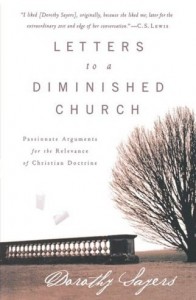I have been working through a great book by mid-century literary scholar Dorothy Sayers (Wikipedia) that touch on the topic of art and expression. They were very meaningful so I thought I would quote a portion below, if you want to read the work it’s called ‘Toward a Christian Esthetic‘ in the book Letters to a Diminished Church. If you are wondering, she is responsible for the most widely read modern English version of the Divine Comedy by Dante and she wrote the mystery series with Lord Peter Wimsey.
Event verses an Experience
To save confusion, let us distinguish between an event and an experience. An event is something that happens to one, but one does not necessarily experience it. To take an extreme instance: suppose you are hit on the head and get a concussion and, as often happens when you come to, you cannot remember the blow. The blow on the head certainly happened to you, but you did not experience it; all you experience is the aftereffects. You only experience a thing when you can express it – however haltingly – to your own mind. (p 162)Affect of True Art
This recognition of the truth that we get in the artist’s work comes to us as a revelation of new truth. I want to be clear about that. I am not referring to the sort of patronizing recognition we get to a writing by nodding our heads and observing: “Yes, yes, very good, very true – that’s just waht I’m always saying.” I mean the recognition of truth that tells us something about ourselves that we had not been always saying, something that puts a new knowledge of ourselves within our grasp. It is new, startling, and perhaps shattering and yet it comes to us with a sense of familiarity. We did not know it before, but the moment the poet has shown it to us, we know that, somehow or other, we had always really known it.Very well. But frankly, is that the sort of thing the average British citizen gets or expects to get, when he goes to the theater or reads a book? No, it is not. In the majoriy of cases it is not in the least what he expects, or what he wants. What he looks for is not this creative and Christian kind of art at all. He does not expect or desire to be upset by sudden revelations about himself and the universe. (p 164-5)
Artistic Impostors
Or take the spellbinding kind of art. This at first sight seems better because it spurs us to action, and it also has its uses. But it too is dangerous in excess because once again it does not reveal reality in experience, but only project a lying picture of the self. As the amusement art seeks to produce the emotions without the experience, so this pseudo-art seeks to produce the behavior without the experience. In the end it is directed to putting the behavior of the audience beneath the will of the spellbinder, and its true name is not art, but art magic. In its vulgarest form it becomes pure propaganda. It can (as we have reason to know) actually succeed in making its audience into the thing it desires to have them. It can really in the end corrupt the consciousness and destroy experience until the inner selves of its victims are wholly externalized and made the puppets and instruments of their own spurious passions…. (p 166-7)
(Headers and emphasis mine)
I realize that you have likely not read the text, and some of her statements seem a bit harsh from our perspective. Yet, I believe within her words above are a caution to anyone attempting to express anything they believe to be true. We must dive into the deepest and darkest corners of ourselves seeking to understand our experience in its reality if we are going to actually present something true to others.
This is overwhelming because of the weight and pain that exists in the recesses of unmaterialized experiences. For one to go about expressing anything of truth means more than just repeating the words of another for a desired response. At the core of this discussion is my discomfort with my rhetorical abilities. Should I manipulate others so to attain a desired result?
I believe that Sayers would say no, that we must seek to give life and expression to the unmaterilaized experiences of those in our audience. That this would then be art and would bring the audience to say that although they had never thought of that, that they have always known it to be their experience. One last quote to follow from Paula Scher a partner at Pentagram (whom is responsible for some of the largest brands in the world) and if we pair her cultural insights with the thoughts above from Sayers I believe the path to leading others deeper becomes more clear.
Be culturally literate, because if you don’t have any understanding of the world you live in and the culture you live in, you’re not going to express anything to anybody else. – Paula Scher
If we are going to express our experience in a truly artistic manor we must not only understand the whole of our experience, but also have a developed cultural literacy or our experience will mean nothing to those who must experience it the most. Just thoughts, but I feel as thought I am getting closer to understanding something that I must know.

